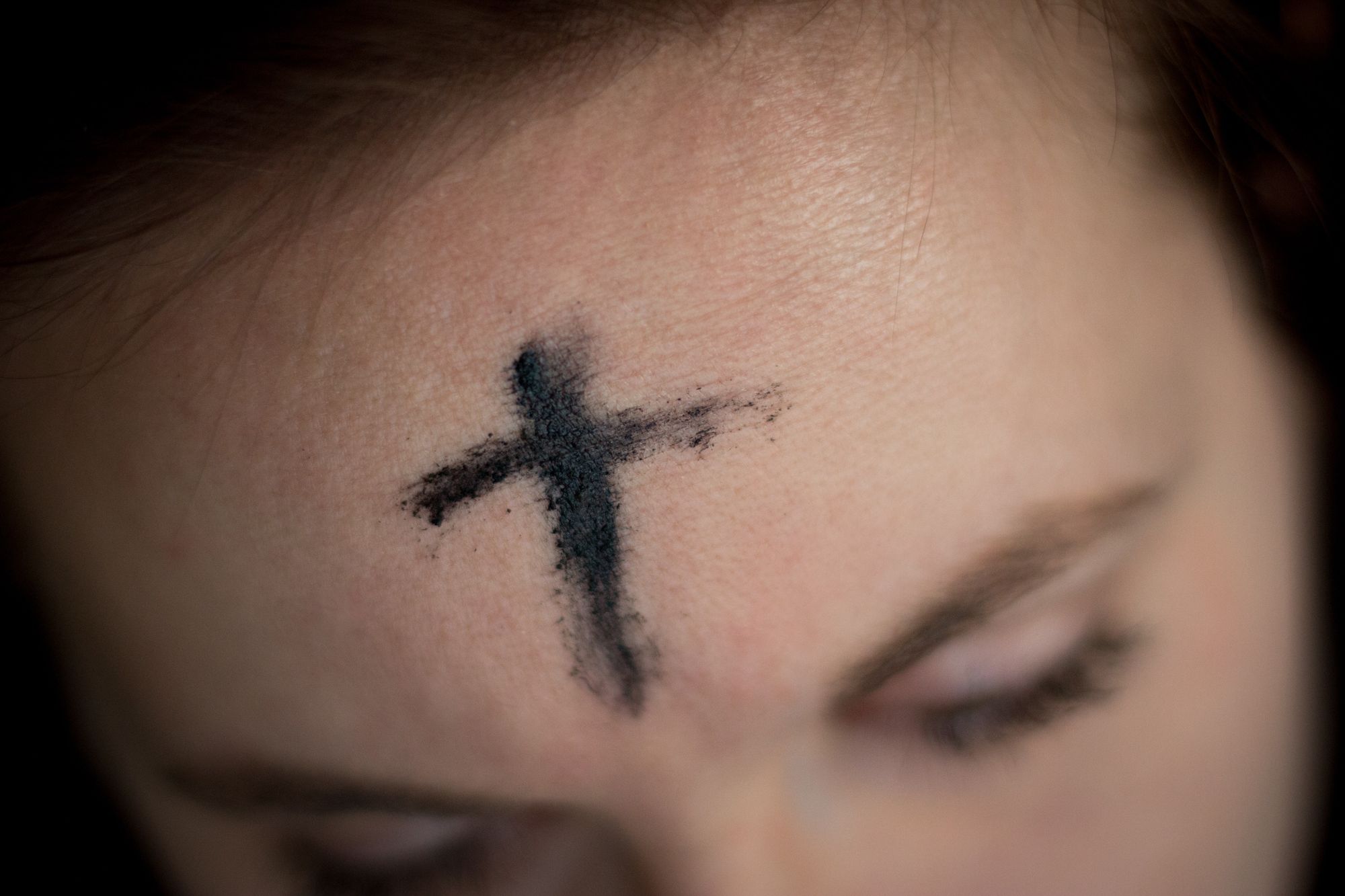Brought Down To Earth: Ash Wednesday & Strategies for Remembering Our Mortality

“He needed to be brought down to earth…”
We might find ourselves uttering such words on occasions, often in reference to some unlucky fool whose ego has been dramatically deflated, or whose ethically-questionable fortunes have turned in a moment. “It was coming to him,” we sometimes say.
But what if all of us could do with being brought down to earth? Brought right down to earth, to the reality that one day we will return to this earth from which we came.
Dust to Dust
“For dust you are and to dust you will return.”

Those are words taken from the judgment issued to Adam in Genesis 3:19. And they’re words traditionally repeated on Ash Wednesday, the beginning of the Christian season of Lent, a day where we intentionally remember that our future is death.
To be honest, I’ve not really gone in for Lent in a big way over the years. The whole ‘giving stuff up’ thing can seem to focus the spotlight on ourselves, rather than lifting Jesus up.
But if we buy into the Christian calendar when it comes to Christmas, Easter, and even Advent, then why not Lent?
Yes, for the Christian every day is to be a ‘remember the cross’ day, just as every day is a ‘remember the resurrection’ day and a ‘remember Jesus will come back’ day. But perhaps these annual rhythms provide an opportunity us to re-focus our hearts. Chuck Colson explains the ‘Christian calendar’ by saying that, “during these seasons, we encourage certain theological emphases, spiritual practices, and corresponding emotions to instruct and train the church in godliness.”
Not obligatory, of course. Ash Wednesday isn’t in the Bible. But how will you choose to remember your mortality in a culture whose default mode is to assume we’re immortal?
“While I certainly don’t think [Ash Wednesday] is mandatory for Christians or churches, I would simply want to ask the critics, “What’s your strategy? How are you preparing for your encounter with death?”
Life in the Shadow
Because, for most of us, death needs to be brought back into the picture.
Not all of us, of course. For some of us, death’s grip on our lives will feel all too firm. For some of us our mortality is hardly far from our minds right now.
Maybe it’s the debilitation of illness. Maybe it’s the persistent and aching presence of grief. Maybe it’s a general and/or personal sense of life as we know it unravelling before our eyes. However we feel it, the cold shadow of death lingers over us. The tree of life couldn’t be further from our reach.
But for many of us, we need to be brought down to the earth, our cradle and our grave.
Because we’ve become pretty adept at hiding death.
Adept at packaging up its presence and keeping it at arm’s length, away from the daily rhythms of our lives: a rise in care homes; the conversational taboo; the media-infatuation with youth. Often the best our culture can do is to ‘honour’ an individual’s life. ‘Death is nothing at all’, we recite, hoping, wishing. The funeral becomes a ‘celebration’, the wake a party.
Voyeurs of Death
But we can’t keep it at bay forever. One day the eulogy will be about us. One day our Facebook status won’t be updated again. If you’re one of the lucky ones, then the obituary will try and capture your years in a few paragraphs of black ink. Past tense, of course.
And isn’t that denial why we’ve seen the emergence of the Death Cafe movement? And if we cast our minds back to the striking response to the horrific missile attack on an international passenger flight, MH17, in 2014, isn’t our culture of assumed immortality actually breeding voyeurs of death?
But deep down, don’t we know how helpless and hopeless we are? And so in a culture where so much pressure is placed on people to achieve, to maximise one’s experiences, and to control one’s life, we find ourselves not really knowing what to do with death.
In short, our avoidance-tactics aren’t just negligent; they’re dissatisfying too.
The Way To Live Is To Know You’ll Die
The book of Ecclesiastes gets a bit of stick for being a depressing book. But actually it’s full of life and joy. Far from being about the meaninglessness of life, I’m convinced it actually teaches us how to really live.
But the way to live is to know you’ll die:
“It is better to go to a house of mourning than to go to a house of feasting, for death is the destiny of everyone; the living should take this to heart.” (Ecclesiastes 7:2)
The final chapter of Ecclesiastes paints a graphic illustration of death as a slow and painful de-creation. Actually talk to someone who knows they’re in their final years and they’ll tell you all about it.
But when you know you’re dying, then you’re reminded of the gift of life.
Life begins when we see we are all creatures, born into a world where life is fleeting and fragile. Life can be found when we see we are all sinners, born into a race that lives under the consequences of our turning from God.
Remember Your Name And The One Who Named You

The clue’s in the name: Adam.
When God creates man, adam, he names him after the ground, adamah. Like a child understanding their name for the first time, Ash Wednesday is about helping us to re-learn our name. It is about remembering who we are.
And if anything, that should cause our gaze to be turned to the One who gave us that name. As Ecclesiastes puts it, to “remember your Creator” (12:1). He is the One who scooped up that dust and first made man. He is the One who breathed into our nostrils the breath of life. He is the One against whom we staged a revolution that led to being banished from the place of life.
And so He is the only One who can provide a way back.
What can you do to remember that?
Maybe you’ll partake in an ‘Ashing’ service, where a cross is marked with ashes on the hand or forehead? Maybe you’ll gather the family and light a match, before blowing it out and rubbing its ash between your fingers? Maybe you’ll spend some time prayerfully reading through Ecclesiastes 11:9-12:8, whilst streaming this album?
Of course, it’s got to be more than a day. I read recently of a church that had been built in the shape of a coffin in order to remind the congregation of their mortality. Likewise, the skulls that often decorated the insides of older churches were a reminder of that mortality.
But will we remember our name?
Glorious Dust
But by turning our eyes to our Creator, Ash Wednesday also reminds us where our hope is.
In the gospel of Christ crucified and risen, God promises to take the perishable and clothe us with what is imperishable (1 Corinthians 15:52).
If God can take adamah and fashion Adam, why can’t that same Creator take our dust and re-make us after the likeness of the ‘man of heaven’, the second Adam, the risen Jesus Christ (1 Corinthians 15:22,44-48)?
Death is real. Death is coming. Death is an enemy.
Ash Wednesday asks us whether we realise that. It asks us whether we’re ready. It asks us whether we’ve turned to the One who can bring life in the face of death. Ashes are for life, not just for Wednesday
And as we find our place amidst the dust and ashes, it’s only then that we learn to cry out, ‘Thanks be to God, who gives us the victory through our Lord Jesus Christ’ (1 Corinthians 15:57).
As Mike Cosper has put it,
“To those critics, I’ll agree: Ash Wednesday isn’t required. But preparing for our encounter with death is a gospel priority. We live in a culture loaded with death-denying strategies. How are we, as the church, refusing the blinders they offer, staring death in its face, and saying all the more boldly, “Where is your sting?”
We are dust, but in Christ our future is glory.
We walk towards our grave, but the tomb is empty.